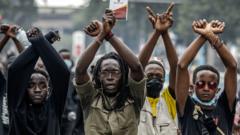Did Kenyan Authorities Hire Trolls to Target Gen Z Protesters?

Published: 2025-11-19 15:00:20 | Category: world
The Kenyan government's alleged use of state-sponsored trolls to intimidate young protesters during recent anti-government demonstrations has raised significant human rights concerns. According to a report from Amnesty International, agencies within the government not only deployed trolls but also utilised surveillance and disinformation tactics to suppress dissent among activists, particularly targeting "Gen Z" individuals who mobilised on social media platforms.
Last updated: 31 October 2023 (BST)
What’s happening now
The situation in Kenya remains tense as authorities face scrutiny over their handling of protests that erupted in 2024 and continued into 2025. Amnesty International's findings suggest a systematic effort by the government to silence dissent through intimidation and harassment, particularly targeting young women and LGBTQ+ activists. With over 100 fatalities reported and numerous incidents of police violence, the government's response to dissent is under severe criticism both domestically and internationally.
Key takeaways
- Amnesty International reports that the Kenyan government employed trolls to intimidate young protesters.
- Government officials have denied allegations of harassment and violence against citizens.
- Protests were primarily led by "Gen Z" activists using social media for mobilisation.
Timeline: how we got here
The protests in Kenya have a complex timeline marked by escalating tensions between citizens and the government. Key events include:
- 2024: Protests begin against proposed tax increases and rising femicide rates.
- Early 2025: Protests intensify, leading to violent clashes between police and demonstrators.
- October 2023: Amnesty International releases a report detailing government tactics against protesters.
What’s new vs what’s known
New today/this week
Amnesty International's report, published in late October 2023, reveals the extent of the Kenyan government's digital warfare against young activists. The report highlights that individuals were paid to promote pro-government narratives and suppress protest hashtags on social media platforms.
What was already established
Prior to the report, there had been widespread knowledge of police violence during protests and allegations of government suppression of dissent. However, the new evidence of systematic disinformation campaigns and targeted harassment adds a new layer to the ongoing human rights crisis.
Impact for the UK
Consumers and households
The unrest in Kenya may have indirect implications for UK consumers, particularly in sectors reliant on trade with the region. Disruptions in Kenya could affect the supply chain and availability of goods, potentially leading to price increases.
Businesses and jobs
For UK businesses operating in Kenya, the current climate of fear and instability may hinder operations. Companies may have to reassess their risk management strategies and consider the safety of their staff amid ongoing protests and potential government crackdowns.
Policy and regulation
UK policymakers are likely to monitor the situation closely, especially in terms of human rights implications. Any sanctions or diplomatic measures against the Kenyan government could be influenced by the findings of organisations like Amnesty International.
Numbers that matter
- Over 100 fatalities reported during protests in 2024 and 2025.
- Protesters received threats, with some individuals paid between 25,000 and 50,000 Kenyan shillings (approx. £145-£300) per day to disseminate pro-government messages.
- Targeted harassment disproportionately affected young women and LGBT+ activists, according to Amnesty's findings.
Definitions and jargon buster
- Gen Z: Refers to the demographic cohort born between the late 1990s and early 2010s, known for their proficiency in digital communication.
- LGBT+: An acronym referring to Lesbian, Gay, Bisexual, Transgender, and other sexual and gender minorities.
- Disinformation: False or misleading information spread intentionally to deceive others.
How to think about the next steps
Near term (0–4 weeks)
In the immediate future, observers should watch for further government responses to protests, as well as any potential escalations in violence against demonstrators.
Medium term (1–6 months)
Over the next several months, the situation may develop depending on domestic and international pressures on the Kenyan government. The potential for dialogue between the government and protesters should be monitored as a crucial factor.
Signals to watch
- The number of protests and government responses to them.
- Any international reactions or sanctions imposed by foreign nations.
- Changes in the rhetoric of Kenyan officials regarding protester treatment.
Practical guidance
Do
- Stay informed about the latest developments regarding protests in Kenya.
- Support organisations that advocate for human rights and provide aid to affected individuals.
Don’t
- Engage in or endorse violent actions against any group involved in the protests.
- Spread unverified information related to the protests or government responses.
Checklist
- Verify the credibility of news sources before sharing information.
- Consider the implications of the situation on global trade and human rights.
- Support local and international campaigns focused on human rights in Kenya.
Risks, caveats, and uncertainties
While Amnesty International's report provides substantial evidence of government suppression tactics, it is essential to acknowledge the potential for biases in reporting and the challenges in obtaining accurate information from conflict zones. The situation is fluid, and further developments may alter the current understanding of the events in Kenya.
Bottom line
The situation in Kenya highlights a troubling intersection of technology and human rights, as the government allegedly employs digital tactics to suppress dissent and intimidate young activists. The implications for both local and international observers, including UK citizens and businesses, are significant as the crisis unfolds.
FAQs
What tactics did the Kenyan government reportedly use against protesters?
The Kenyan government allegedly employed state-sponsored trolls, surveillance, and disinformation campaigns to intimidate and silence young protesters during recent demonstrations.
How has the international community responded to the protests in Kenya?
International reactions are still developing, but there is increasing scrutiny from human rights organisations and potential for diplomatic measures against the Kenyan government.
What impact might this have on UK businesses?
UK businesses may face operational challenges and increased risk assessments due to the instability in Kenya, which could affect supply chains and employee safety.



